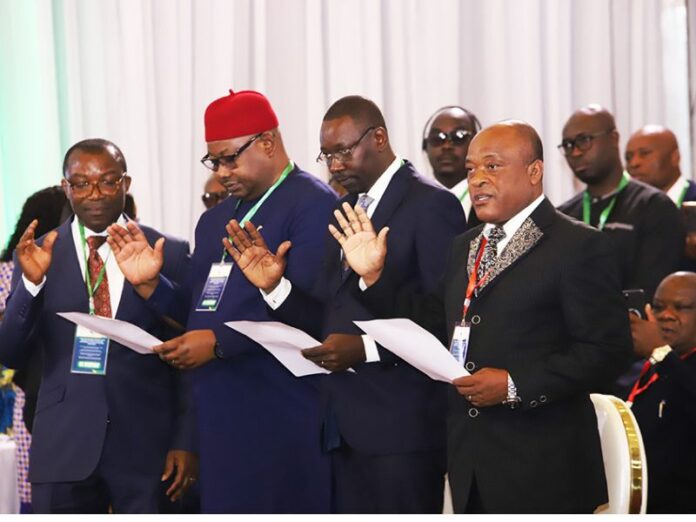President Akufo-Addo, who is also the Chairman of the Gulf of Guinea Commission (GGC) has advocated for a joint force to battle illegalities at sea.
The President holds the view that a well-coordinated collaboration and cooperation among the states of the region is crucial, due to the interconnectivity of maritime activities.

President Akufo-Addo was addressing the Commission at its third extraordinary session of the Assembly, held yesterday in Accra.
The President called for oneness “so that collectively we can make a significant difference in maintaining maritime peace and security in the Gulf of Guinea region.”
He added that working together would enable the member states to build a “safe, secure and prosperous” Gulf of Guinea region for sustainable development.
PURPOSE
President Akufo-Addo, as chair, tabled for discussion measures to safeguard the region and make it prosperous, as well as the deliberation on whether to open up the Commission.
He wanted the Commission to comprise all countries on the coast of West and Central Africa, from Cape Verde to Angola, instead of the existing Côte d’Ivoire to Angola.
According to him, if his proposal is accepted, the 2001 Treaty that established the Commission would have to be amended.
“These are the items on our agenda for our closed-door session and it is important that we have some serious discussions on these items in order to come up with strategies geared towards strengthening peace and security and winning the fight against maritime-related crimes in the region, such as piracy…”
SWEARING IN
The first part of the meeting swore in new executive members and then moved into a conclave with the second part.
Ghana, which joined the Commission in 2017 has taken over the chairmanship of the Commission from Nigeria, chaired by its president, Buhari.
The new executive committee members would steer the affairs of the Commission for the next three years.

President Akufo-Addo congratulated them and urged them to give their best in the interest of the Commission.
He also commended the immediate past executives, particularly its Executive Secretary, Florentina Adenike Ukonga, for their work for the Commission, regardless of the challenges that faced them.
The outgoing Executive Secretary, Florentina Adenike Ukonga gave an account of her reign, which detailed the challenges the Commission faced and steps put in place to address them.
She mentioned the non-payment and delay in payment of contributions by member states to the Commission.
She also mentioned the vacancy available for Director of Finance, which needs to be filled as soon as possible.
President Akufo-Addo and Ghana’s Foreign Minister, Shirley Ayorkor Botchway, added their voices separately on the need for the position to be filled.
They urged other member states that do not hold positions on the Commission to apply.
Madam Shirley Ayorkor Botchway made a strong case for member states to pay their contribution to the Commission.
On this call, the new Executive Secretary, Jose Mba Abeso also spoke to it in his acceptance speech.
Former President Buhari, Nigeria and the President of Equitorial Guinea were among the heads of state who attended the meeting.
ABOUT GGC
The Gulf of Guinea Commission is an international body that was established by the Treaty signed in Libreville, Gabon, on July 3, 2001, and comprises Angola, Congo, Gabon, Equatorial Guinea, Nigeria and Sao Tome and Principe.
The Commission is now made up of nine states, for which President Akufo-Addo advocated for expansion to include all 19 coastal states.
The Commission is mandated to constitute a framework of consultation among the countries of the Gulf of Guinea for cooperation and development, as well as for the prevention, management, and resolution of conflicts that may arise from the delimitation of borders and the economic and commercial exploitation of natural resources within the territorial boundaries, particularly in the overlapping Exclusive Economic Zones (EEZ) of our States.










